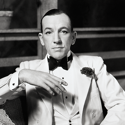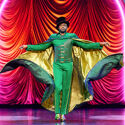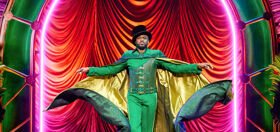
Two forces have drive Chris Willis‘ career: the church and music. And, at time, they worked in tandem, like when the Dayton, Ohio, native sang in a gospel quartet with his three siblings.
Those formative years sent him on his aural way, but the experience came with a price: self-hatred. Once on track to spread the good gospel word – in fact, he had a record deal in the 1990s – Willis eventually broke with the genre to pursue more mainstream pursuits.
After singing backup for the likes of Ricky Martin and American Idol, Willis eventually fell in with a French pop group and, through them, met David Guetta, a bona fide house music super star. Since they began working together at the turn of the century, Willis and Guetta have had a string of hits, but none as successful as “Love Is Gone,” which recently broke the United States’ top 40 chart.
While he’s largely turned his back on organized Christianity, Willis’ religious roots definitely shine through when asked to discuss racism, coming into his own and rising above harassment.
How about we take this to the next level?
Our newsletter is like a refreshing cocktail (or mocktail) of LGBTQ+ entertainment and pop culture, served up with a side of eye-candy.
The singer tells our editor all about it, after the jump…
Andrew Belonsky: You grew up in Ohio, where I also came of age. While a fine state, it’s not always the most progressive place. What was it like for you growing up gay in a religious environment?
Chris Willis: Torture! Torment! Pain! Shame! [Laughs] But music is really what kept me grounded and believing there was hope. People always suspected I was gay, but they were like, “You know, he can really sing his ass off,” so there was just that love of the music and passion that came through in my work. I never knew where it would take me, but I always stayed close to the music, because whenever I was down or depressed or feeling bad, it was a really a great lift for my spirits.
AB: Do you remember any specific occasion when you were harassed?
CW: That was probably happening in my early childhood, but when you grow older, you kind of learn how to fit in and shift your behavior. There was more racial stuff that I experienced in my high school years.
AB: I can imagine…
CW: Yeah. So, there was that whole sexuality thing and racial thing. When I first got involved in music, my head was still full of negative voices, but, I always focused on rising above that and not really knowing how, but I just kept at the music. I was like, “You know what? I’m going to make these people love me for my music and my work.” And my anxiety shifted, because – you know, a lot of the time we do the things we do out of fear; we’re trying to hide and not be discovered – but I turned it around and really started being more empowered by my color and my sexuality. I didn’t see them as liabilities, but as assets.
AB: Have you been back to Ohio to perform?
CW: The last time I went to perform was – oh, it’s been years, it was probably when I was still doing gospel. But now, you know, I usually just go home and visit my dad and we just have family days. I’m very close with my family. Their support through the years – because in those days I believed that if I didn’t keep doing gospel, I was going to hell.
AB: You really believed that?
CW: I did, but I got to the point where I was like, “If God really is a forgiving and loving God and is open about creating us, why would he limit our abilities in that sort of way?” I gave myself permission to explore music – period. I did choir, industrial shows, gospel and I was singing backup – it was just a wide palette. That’s always a double-edged sword, because when you’re good at many things, people don’t know who you are, what you do, so thank God for house music, which really gives me chance to be so many different characters. I can do the rock and roll squalling, I can do the 80s-esque melodic stuff. I’m able to do all of that stuff, but I don’t think I would have been able to experience all that I’ve experienced had I limited myself to just one genre.
[The video for Guetta and Willis’ “Love Is Gone.”]
AB: I’d like to talk about an article I wrote last week on the National Black Justice Coalition. They’re the only existing national black gay rights organization and are very much based in the civil rights movement, which causes some tensions, like how do they straddle both movements? Speaking with the group’s leaders, I heard of resistance from gay groups. Now, I’ve always wondered about racism within gay communities – have you experienced any?
CW: I think that the more I thought about and focused on racism, the more I felt it. The less I thought about and focused on it, the less I felt it. I’m curious about that theory – I don’t know if it works for everybody, but I just started playing games with myself, pretending like racism doesn’t exist. I’m not being naive or ignorant, because I do believe it still lives in some people’s hearts. Meditating on that philosophy also helps me not focus so much on racism that comes from other people, but on the racism that exists in my own heart. And once I started challenging that, I realize I can’t get mad at someone if I’m not willing to come to terms with my own racism. And I have had to.
AB: How so?
CW: I’ve been on so many tours where I am the only black artist. For example, I was on tour with an artist and I was reading Richard Wright’s Black Boy and I found that the more I read that book, the more angry, the more black power focused I became, and that’s when I realized I was really coming to terms with my own racism. I also realized that as long as I was focusing on it, I could see it – I felt it. Now I wonder “How can I really celebrate God and believe that judgment-free nature of God, when I’m carrying my own judgment in my own soul?” When I walk into a bar or a room full of white people and I’m expecting them to treat me a certain way… If I walk up to someone, white, black or whatever, if I ask them how their day is, all of a sudden someone cares about me – whatever preconceived idea they may have had about me, or I had about them, it changes. It’s really a matter of love, and we all need love, no matter what color, no matter what sexuality we are. If we really diminish it down to love and start from that place, I think some really amazing, incredible changes will happen.
AB: You kind of answered the second part of the question, but I’m curious, have you felt any homophobia within black communities.
CW: I have the same answer. When I think about it and expect it, I find it, and I’m still in practice of not thinking about it, not expecting it, but looking for the good and seeing the good. I think the thing that I see the most and hear the most, especially in terms of the arts, is a witch hunt from the gay community – “Oh, I know he’s gay” or “He’s got to be gay.” On one hand, I think it’s nobody’s business. It really shouldn’t be an issue. But, that said, I do understand, because I think we’re all looking for role models or somebody that we can believe in – somebody who’s going to tell us the truth. What I try to practice now is “Does it really matter? Does it really change my attitude about who that person is?” I know that when I was younger, I was terrified of admitting it out loud, like this great thumb of God would squash me, but the less power I gave it, the less afraid I felt about it.
AB: Do you still go to church?
CW: I don’t go as much as I used to. I went to church and for so long I felt there was a shaming factor that happens in sermons and churches, and I went through a process where I needed to be in places where I wasn’t experiencing that, because I was still experiencing that condemnation and I would hear it, and I would think to myself, “Well, if it’s really about love and we’re really supposed to share the message of love, why is that not the message that I’m hearing?” And now I just have chosen to go where I hear that message of love – I create that environment in my home, I experience that with my family, and I think that’s the best you can do. The best thing I can do – there’s this song in the church that says, “Brighten the corner where you are,” just share that love and hopefully that sharing will go further and further.



















Tom
He has an incredible voice….and he is a hottie.
Giovanni
Great interview. It’s always a good thing to hear from talented OUT perfomers.
REAL Friend!
@cecil cockman: Ok, I don’t know who YOU are but you are STARVING for attention by slandering Chris this way! He is a Friend of mind and I am embarrassed for you to put his # for all the world to see (Wrong or Right)! You are a disgrace to the Gay or Straight community!! DISGRACE!!!!!!!!!!!!!!